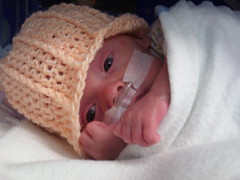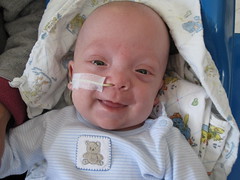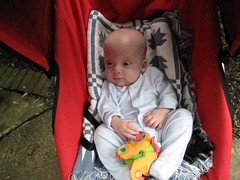Carolyn sat at Max's bedside this morning and observed physical therapist A. working with Max. The physical therapists are our current favorite NICU team members because they have seen him progress from a very low state of function to his present condition, and hence think that he might continue to get his act together so that in the future he might be able to eat and poop at the same time (the autonomic nervous system equivalent of walking and chewing gum). Carolyn is still pretty sick with what her doctor has now diagnosed as a viral infection and is trying not to infect Max or his father.
With the radiology machine fixed, Max got his barium swallowing study today. The NICU team fed Max some barium-laced milk while observing him through a fluoroscope (allowing them to take a kind of x-ray "movie" and observe the path of the milk through his body). They were looking for signs that Max was taking milk into his lungs; that is, "aspirating" his milk. They believe that his significant episode of respiratory distress yesterday, which followed some bottle feeding, was the result of Max aspirating his milk. They also think that Max's persistent desats are caused by him aspirating food that comes back up his esophagus ("reflux") after he's been fed. They're giving him various anti-reflux medications that are commonly advertised on TV, but Max is not the drug companies' target demographic.
The barium study didn't show that he aspirated very much (if any) of his feed, but the NICU team don't consider it conclusive evidence because he took a long time to suck down the 13 ccs that they finally convinced him to swallow. (This in itself was good news: this is the most Max has ever swallowed on his own.) They think that Max might be able to properly direct small amounts, given slowly, to his stomach and away from his lungs, but that he would aspirate larger amounts given over a shorter period. They intend to repeat the study in a few days, after a period of rest and strengthening. In that time, Max will not get food via bottle.
I spoke to Dr. K. about the outlook and plan for Max. He thinks that Max's brain is having trouble organizing proper swallowing. To get food down one's throat requires the correct sequence of contracting and relaxing muscles in the esophagus (I believe this is commonly called peristalsis but I'm too tired to look it up). Also, Max isn't properly closing the sphincter at the bottom of the esophagus to prevent food from coming back up the throat, where he then aspirates it. Persistently aspirating food is bad for the lung, leading to bouts of pneumonia and improper lung development. If Max doesn't get the hang of swallowing food, he may need a kind of surgery on his esophagus. Dr. K. emphasized that this was a long way off, but that he wanted to mention it so that it wouldn't come as a surprise to us if someone brought it up down the line.
Dr. K. said that some babies with this problem have no other issues, but that it's commonly seen in babies with other neurological deficits. And with Max's history of head bleeds and hydrocephalus, it would certainly make sense that his difficulty swallowing is one manifestation of a broader problem. Dr. K. said that he likes to think that babies differ in their potential and that parents should work to help their children achieve that potential. He also said that the best predictor of a baby's eventual success is the educational attainment of its parents. (Someone must have told Dr. K. that Max's mother just published a book and hence has attained about as much education as it's possible to get.)
Carolyn and I accept that Max may indeed have significant neurological problems to deal with. But we've also watched him to struggle to get the hang of very basic bodily functions, including pushing out stool and breathing successfully. However, he's gotten the hang of those two life skills (although I wouldn't yet give him great grades in either, he continues to make progress). To us, eating just seems like a harder class than pooping or breathing, and we expect that it will take him some time to pass it. At first, he'll get horrible grades and sometimes scare the dickens out of us, but over time he'll get the hang of it. Is this just denial? Of course it is. But without a robust sense of denial, we'd never sign up for insane projects such as writing textbooks or papers about the subprime crisis. Denial is what allows us to fantasize about the possibilities beyond our grasp but within our reach.
Spending Dec. 31st in hospitals is getting to be a habit. A year ago today, Felix had surgery to repair a ruptured bladder (see picture below). That turned out to have a happy ending, and we remain convinced that this will too.

Although we can't rule out that Felix's hospital stay didn't do him permanent damage. Consider his pronunciation of "fork":




